Burma: Political Reforms and the Impacts on Humanitarian Efforts
Lynn Yoshikawa, Advocate, Refugees International
Photos | Transcript
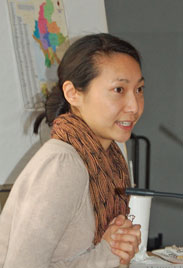 Washington, DC—On January 13th, Refugees International advocate Lynn Yoshikawa briefed Women’s Foreign Policy Group on the recent political reforms in Burma and the impact on the humanitarian situation in the country. Recently returned from Burma, Yoshikawa shared her first-hand experience and covered the situation facing refugees, internally displaced persons, and ethnic minorities, as well as the impact of recent political changes on relations with the US and countries in the region.
Washington, DC—On January 13th, Refugees International advocate Lynn Yoshikawa briefed Women’s Foreign Policy Group on the recent political reforms in Burma and the impact on the humanitarian situation in the country. Recently returned from Burma, Yoshikawa shared her first-hand experience and covered the situation facing refugees, internally displaced persons, and ethnic minorities, as well as the impact of recent political changes on relations with the US and countries in the region.
Interest in Burma has increased over recent months as the world waits to see if the first civilian government in decades will follow through on promised reforms. Home to over 100 ethnic groups, Burma has struggled with conflict between the Burmese majority and other armed ethnic groups, sometimes supported by neighboring countries. Despite the new atmosphere of optimism in Burma, Yoshikawa pointed out that the situation for refugees and IDPs is still grim. For instance, conflict in two regions has recently caused “…approximately 60,000 people [to be] displaced and a number of [reported] human rights abuses.” Meanwhile, Yoshikawa said another ethnic group, the Rohingya, “lack very basic rights that leave them in pretty serious humanitarian conditions.” To help this group and others, Yoshikawa urged the US, UN and other major donors to increase humanitarian relief.
Yoshikawa addressed the question of why the reforms were occurring now. She explained that, although changes in Burma seem sudden, the change has been “simmering for quite a while now.” The military junta, she argued, was compelled to act by a series of events including the 2007 Saffron Revolution, the devastation of Cyclone Nargis in 2008, the growing anti-Chinese sentiment, and the realization that concessions, like a civilian government, are vital to the nation’s stability. Burma’s recent reforms and the release of Nobel Laureate Aung San Suu Kyi have reversed Burma’s state of near total isolation. The government hopes to normalize relations with the international community and on the morning of the event, Secretary of State Hillary Clinton announced that the US will send an ambassador to Burma.
According to Yoshikawa, the international community will continue to watch as Burma prepares for the upcoming elections and their 2014 chairmanship of ASEAN. The Burmese government will also continue to be scrutinized for their handling of the military and armed minority groups. Yoshikawa closed by asserting that the international community has an important role to play and that they should change restrictive aid policies to help the new civilian government and civil society increase their capacity and continue to implement the necessary reforms.
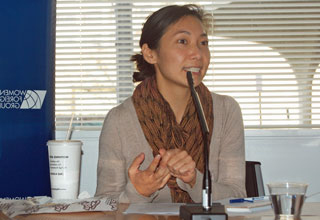 |
 |
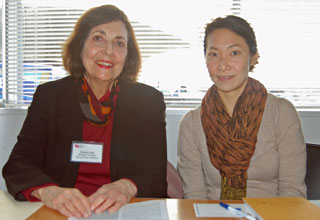 |
Refugees International Advocate Lynn Yoshikawa
speaks to the audience
|
|
WFPG President Patricia Ellis and
Speaker Lynn Yoshikawa
|
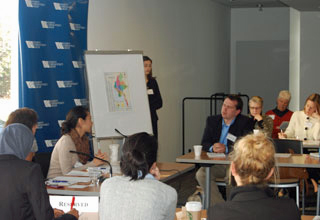 |
 |
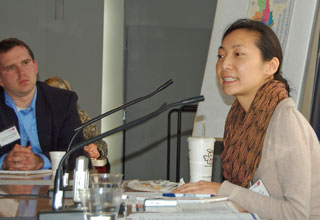 |
| |
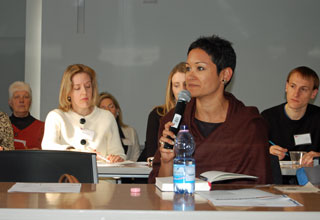 |
 |
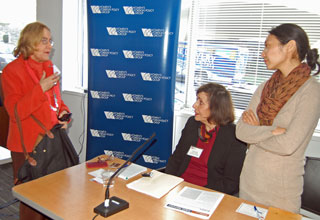 |
| |
|
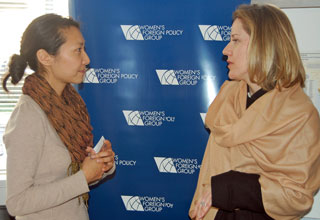 |
 |
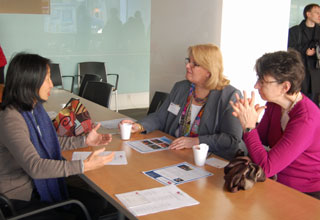 |